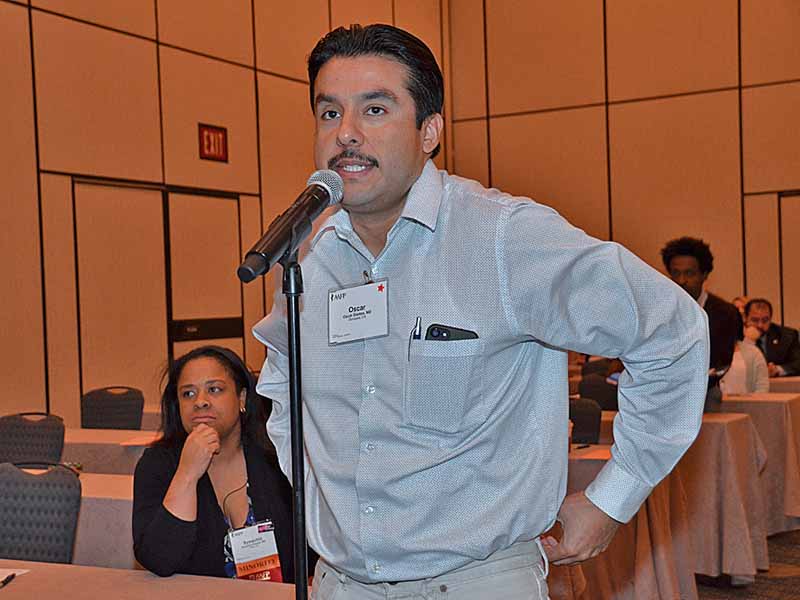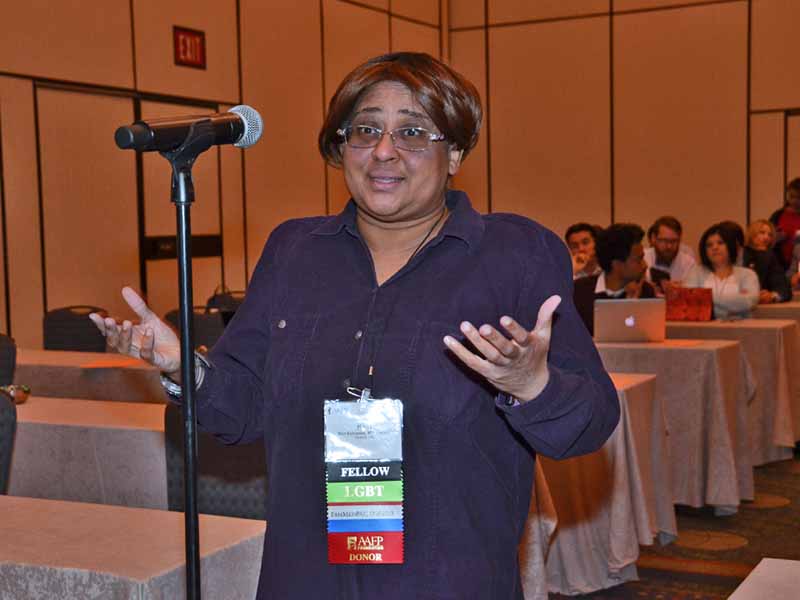FPs Focus on Empowering Physicians, Protecting Patients
May 01, 2018 02:58 pm Sheri Porter Kansas City, Mo. – Family physicians from across the country gathered here last week for the AAFP's annual National Conference of Constituency Leaders (NCCL) to make their specialty stronger, the practice of family medicine less burdensome, and the health and welfare of their patients better.
From April 26-28, AAFP members in attendance chose to represent themselves or one of five constituency groups recognized at this conference: women; minorities; new physicians; international medical graduates (IMGs); and lesbian, gay, bisexual and transgender (LGBT) physicians, and those who support LGBT issues.
During the hearing of the Reference Committee on Organization and Finance on April 27, members discussed issues including creating physician resources to care for a growing Latino population, adding a public member to the AAFP Board of Directors, and finding avenues to engage rural physicians.

Oscar Gantes, M.D., a general registrant and minority member from Gonzales, Calif., tells the Organization and Finance Reference Committee, "There's no outlet available for physicians who don't speak Spanish to understand Latino culture," which interferes with the patient/physician relationship and undermines the desire of some Latino patients to seek health care.
Empowering FPs to Care for Latino Populations
Claudia Mercado, M.D., a general registrant from Laredo, Texas, and member of the IMG constituency, introduced a resolution asking the AAFP to help family physicians provide health care for the nation's growing Latino population.
She noted that estimates show by 2060 one in three people living the United States will be of Hispanic origin, and she pointed out the need for more family physicians who can both speak Spanish and provide culturally appropriate care to this population.
"The AAFP could help by providing culturally competent training for non-Hispanic physicians, including CME training for medical Spanish and providing resources for patient education in Spanish," said Mercado.
Story Highlights
Saphu Pradhan, M.D., of Salt Lake City, a member of the women's constituency, said, "This population faces multiple challenges, including financial and resource challenges. And language is another one, especially if patients are in rural communities where interpretation is not always available or accurate."
New physician delegate Alan Michael Vargas, M.D., of Glenwood Springs, Colo., gave the resolution his support but voiced his displeasure with the assumption that only non-Latino physicians need this support.
"I'm a Latinx physician myself," he said, using an emerging gender-neutral term for people and cultures from Latin America, "but I'm telling you, my Spanish isn't that great."
Vargas also noted that Familydoctor.org has information in Spanish as well as English that he shares with his patients.
Ultimately, delegates adopted a substitute resolution during the April 28 business session that asked the AAFP to investigate physician training in culturally competent care specific to the Latinx population, including social determinants of health as barriers to care and medical-Spanish training in the form of CME programming.
Adding a Public AAFP Board Member
Jennifer Brull, M.D., of Plainville, Kan., and a member of the women's constituency, was one of eight co-authors on a resolution asking that a public member be added to the AAFP Board of Directors by Jan. 1, 2020.
She told the reference committee that she had "very limited experience with having someone outside the physician circle sit at the board table," until she served as a physician representative on the board of Family Medicine for America's Health.
Brull said two "amazing women" serving as the patient voice on that board changed her perspective.

Kim Eubanks, M.D., of Atlanta, representing the lesbian, gay, bisexual and transgender constituency, tells the reference committee that including a member of the public on the AAFP Board of Directors would add another perspective to the decision-making process.
"Many times, my own paradigm has been shifted because of words from these women who are outside the tyranny of knowledge and therefore see things in a way that I cannot see. We need to hear the patient voice, even if the conversation is hard, to reach the next level in partnering with our patients," said Brull.
She added: "Some may say that the AAFP is a member organization designed to serve and support family physicians, not their patients. I argue that we cannot support family physicians without their patients."
New physician and general registrant Samuel Mathis, M.D., of Galveston, Texas, testified that other medical organizations, including the AMA, already include members of the public on their boards.
"This is not something that is outlandish for us to consider," said Mathis. Physicians should be listening not only to their physician colleagues, but to patients as well, he added.
The delegates voted to adopt a substitute resolution that directs the AAFP to add a public board member by Jan. 1, 2021, giving the Academy an additional year to fulfill the request. A second resolved clause was added that specified the resolution be referred to the AAFP Congress of Delegates.
Engaging Rural Physicians
Vargas co-authored a resolution seeking ways for the AAFP to assist rural family physicians in their practices.
"I am a rural physician," he said, adding that many rural physicians practice in areas where they don't see each other much, which can leave them feeling disengaged.
"We're looking for help surveying members to see what they want in terms of engagement to reduce those barriers and get them back into this organization that does so much for us," Vargas said.
Kelley Withy, M.D., of Kailua, Hawaii, a general registrant in the women's constituency, said the working group for rural health on which she serves has discussed the isolation of rural physicians.
"I'm from a small state where about a third of our doctors are rural and very vulnerable right now, and this would mean a lot to them," said Withy. "A lot of them say to me, 'Oh, what does the AAFP do for me? I don't see it.' But this is speaking to them."
Co-author Robert Sedlacek, M.D., a new physician delegate from Merrill, Wisc., pointed out that some states already have rural physician organizations. "It would be good for us to partner with those and draw on their experiences," he said. "We need to bring those physicians back in and give them a way to collaborate with each other.
The delegates adopted a resolution that directs the AAFP to survey members to identify barriers to engagement that should be addressed and also asks the AAFP to develop a toolkit that chapters can use to partner with rural physician organizations in their states.
Preparing FPs for Political Office
Kimberly Becher, M.D., of Clendenin, W.V., a new physician constituency member, co-authored a resolution on getting more physicians into elected offices. Her testimony during the reference committee was short and to the point: "Basically, I want to run for office, and I want some help in figuring out how to do that as a family doctor."
Ean Bett, M.D., a general registrant from Columbus, Ohio, called the idea "terrific," and said the country would benefit from having those with a medical education serving in public office.
Andrew Lutzkanin III, M.D., new physician delegate from Hummelstown, Pa., strongly supported the measure. "Obviously, we'd like to see more family physicians get into leadership position at the federal level," he said.
Lutzkanin pointed out that AMPAC, the AMA's bipartisan political action committee, offers a campaign school. "This would be a tremendous resource to look at in terms of what the Academy might model."
Physicians in practice need tips on how to plan a successful political campaign, he added.
Anna Lowell, D.O, M.P.H., a minority delegate from Sarasota Fla., endorsed the resolution and also called for more underrepresented family physicians in government positions.
"We're very hard pressed to find mentorship and resources that are specifically targeting diversifying the physician workforce," said Lowell.
Delegates adopted a resolution that asks the AAFP to offer family physicians resources and educational opportunities to help them run for political office.
Additional Resolutions
Delegates also voted to adopt
- a resolution that would allow registrants at AAFP-sponsored events and conferences to receive name badges printed with the pronouns they prefer to be addressed by, and
- a substitute resolution asking the AAFP to update resources on Familydoctor.org with inclusive, positive language representing the spectrum of sexuality, to add LGBT family and community resources to the website, and to ensure that the AAFP's website is concordant with these resources.
Related AAFP News Coverage
2018 NCCL Delegates Elect New Leaders
(4/28/2018)
2018 NCCL
Blackwelder: FPs, Go Out and Make the Case for Family Medicine
(4/27/2018)
2018 ACLF/NCCL
Pre-conference Workshop Aims to Advance Health Equity
(4/27/2018)